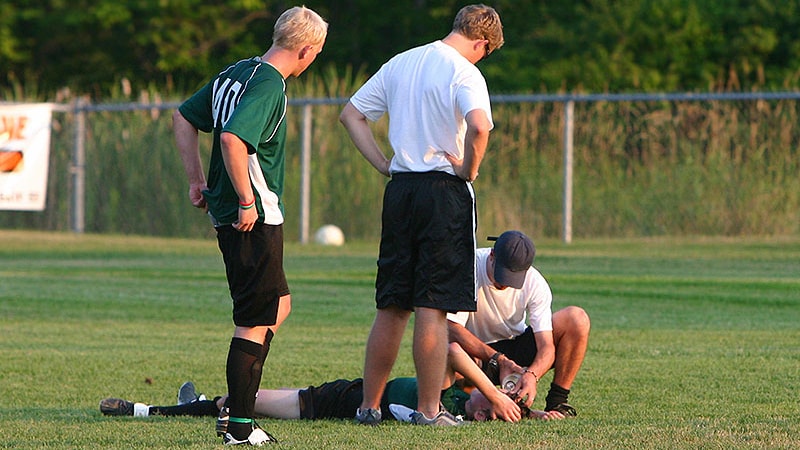An international panel of experts has revised recommendations on optimal management of concussion for athletes at all levels of participation ― with some major changes.
A key update in the new consensus guidance is “don’t cocoon,” panel member John Leddy, MD, said during a media briefing. Leddy is director of the Concussion Management Clinic, University of Buffalo in New York.
Leddy said strong evidence has emerged over the past several years that strict rest of all cognitive and physical activity after a concussion “does not help recovery and probably actually delays recovery.”
In contrast, “controlled physical activity and even aerobic exercise speeds recovery and reduces the incidence of delayed symptoms or persistent symptoms,” Leddy said.
Traditionally, rest and avoidance of cognitive and physical activity were recommended after a sports-related concussion, owing to the prevailing belief that this would allow the brain to recover.
The revised recommendations ― more than 5 years in the making and informed by 10 systematic reviews – stem from the 6th International Conference on Concussion in Sport held in Amsterdam, the Netherlands, in October 2022.
They were published online June 14 in the British Journal of Sports Medicine.
Rest, Exercise, Limit Screen Time
The new guidance states that light physical and cognitive activity, such as walking and easy activities of daily living (ADLs), are both okay in the first 48 hours after concussion and beyond.
Brief (<1 hour), mild symptom exacerbation during recovery, defined as an increase of 2 points or less on a 10-point symptom scale, does not delay recovery.
However, physical and cognitive activity should be stopped if there is more than a mild increase in symptoms, defined as an increase of greater than 2 points from preactivity level.
The new guidance also states that prescribed aerobic exercise in the 2 to 10 days after injury, personalized to the tolerance level of the athlete, aids recovery from sports concussion.
There is evidence that patients recover an average of 5 days faster with early aerobic exercise than without.
“That’s an entire school week,” Leddy noted, “so we can really impact recovery and get them back to school and sport faster and also prevent a significant portion of them from going on to have a prolonged.”
Another evidence-based recommendation is to limit (but not eliminate) screen use during the first 48 hours after the injury to aid recovery.
There is no need to eliminate screen use during that time, “but if patients can minimize screen use in the first 48 hours, it looks like that helps recovery. Beyond that time frame, we don’t have evidence that it is,” Leddy said.
The new guidance also highlights the importance of sleep for concussion recovery.
“Certainly, adequate sleep is important to anybody, but particularly after a concussion, it’s important to try to get good-quality sleep. The weight of the evidence in our systematic review suggested that adequate sleep was helpful to recovery,” Leddy said.
New Assessment Tools
The consensus statement also introduces a “new generation” of age-appropriate concussion recognition and assessment tools, consensus panel member Jon Patricios, MBBCh, MMedSci, professor of sport and exercise medicine, Wits University, Johannesburg, South Africa, said at the briefing.
These include the Concussion Recognition Tool–6 (CRT6) and the Sport Concussion Assessment Tool–6 (SCAT6 and Child SCAT6), as well as a new tool, the Sport Concussion Office Assessment Tool–6 (SCOAT6, Child SCOAT6).
The SCOAT6 and Child SCOAT6 are “something we haven’t had in the past and which we think will help guide healthcare professionals, from GPs through to emergency services, pediatricians, and neurologists, in managing sports-related concussion,” Patricios noted.
The new document also provides evidence-based strategies for returning to active sport and education after concussion; approaches to concussion prevention; targeted rehabilitation; and a call for a working group to be set up to guide further research on the potential long-term effects of concussion on health.
“We encourage clinicians and sports organizations around the globe to adapt these recommendations to their own geographic and cultural environments to optimize the care of athletes who have sustained, or who are at risk of, concussion,” consensus statement co-chair Kathryn Schneider, PT, PhD, with the Sport Injury Prevention Research Center, University of Calgary, Canada, said in news release.
The work was supported by the conference organizing committee. That support included an educational grant and conference logistical support from the funding partners of the Organizing Committee [Internatio nal Olympic Committee (IOC), Fédération Internationale de Football Association (FIFA) International Ice Hockey Federation (IIHF), Fédération Equestre Internationale (FEI), World Rugby and the Fédération Internationale de l’Automobile ( FIA)]. The original article contains a complete list of author disclosures.
Br J Sports Med. Published online June 15, 2023. Full text
For more Medscape Neurology news, join us on Facebook and Twitter.
Source: Read Full Article



